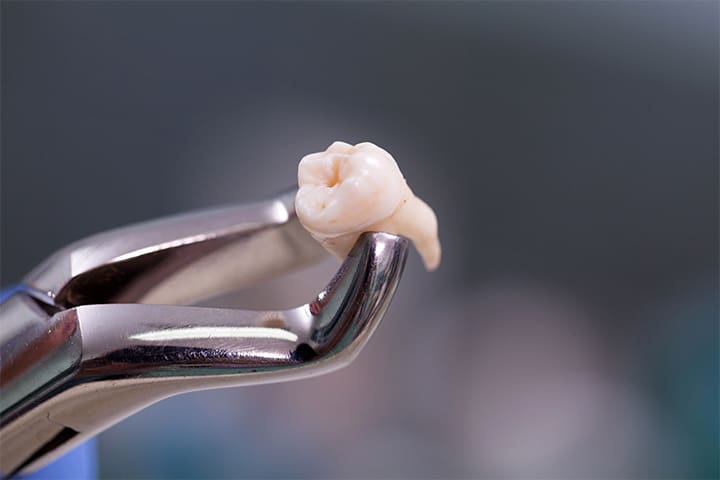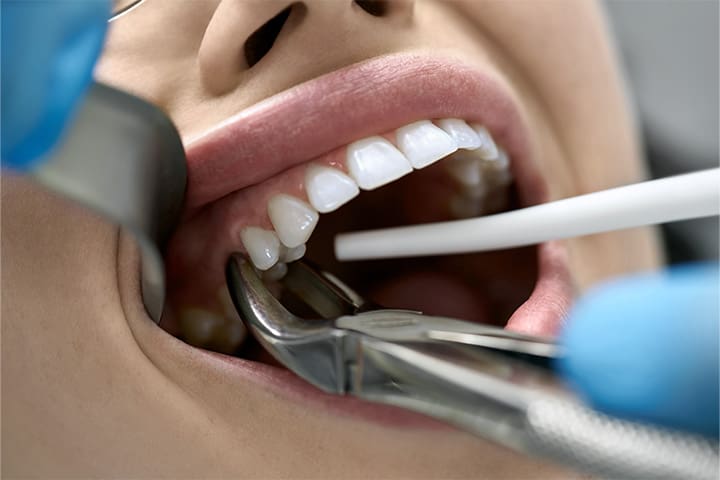Saving Smiles by Removing Teeth

Like any good dental team, we strive to save natural teeth whenever possible. Such parts of your smile are crucial to a healthy mouth, so our top goal is to preserve them. Still, the fact remains that some teeth just can’t be salvaged or saved by modern dental work. We advise tooth extractions at our Weston office for such cases, as they’ll protect your grin from further harm. To learn about them in more detail, please keep reading or book a consultation soon.
Why Choose Weston Dental Specialists Group for Tooth Extractions?
- Dentists with Many Years of Experience
- Advanced Technology & Amenities
- Warm & Friendly Dental Team
Reasons Why Tooth Extractions Are Necessary

Weston Dental Specialists Group doesn’t take tooth extraction lightly. Since this treatment is a last resort, we only perform it when there’s no better option. Our team would much rather give you a root canal, filling, or dental crown; such procedures let you keep your natural tooth.
That being said, tooth extractions are for teeth that can’t be saved. We thus suggest them for reasons like:
- Infection – Once an infection reaches the sensitive pulp, a dentist may not be able to save your tooth.
- Severe Decay or Damage – Teeth damaged beyond repair often need removal.
- Dental Crowding – If you suffer from an overcrowded smile, some of your teeth may require extraction.
- A Weak Jawbone – When the jaw loses density from gum disease, teeth can become so loose that they must be removed.
The Process of Removing a Tooth

At your consultation, our dentists will closely examine your at-risk tooth. They’ll then review their findings to decide whether and what kind of extraction is needed.
We’ll advise a simple extraction if the tooth is already visible. For that type, we first numb the treatment site (using an anesthetic) to make you more comfortable. Our team then rocks your tooth back and forth with dental forceps to loosen it from your bone tissue. From there, we’ll remove your tooth from its socket and stop the bleeding with gauze.
If the tooth hasn’t erupted, you’ll require a complex extraction. This kind starts with a gum incision after we’ve numbed your mouth. Our team will further open this space, divide and remove your tooth in sections, and reduce the risk of bone loss. To wrap things up, we’ll sew the incision closed.
Whether the extraction is simple or not, we’ll suggest replacing your tooth once it’s over. Doing so ensures you won’t suffer from long-term oral issues.
Tooth Extraction Aftercare

To ensure that you heal well after your extraction, use the following tips:
- Rest for at least 24 hours
- Avoid strenuous exercise for at least 24-48 hours
- Eat soft foods, such as soup and yogurt
- Rinse with warm salt water after meals
- Reduce swelling with cold packs
- Take painkillers (and other prescribed medication) as directed
- Avoid spitting for 24 hours after your extraction
- When lying down, prop your head up with a cushion or pillow
- Avoid smoking
- Brush as normal, but take care to avoid the socket
Don’t hesitate to contact us if you have questions after your treatment. Similarly, please let us know if you’re worried about how the socket is healing when you get home.
Tooth Extractions FAQs
Are Tooth Extractions Common?
Yes, extractions are fairly common. Dentists will even remove wisdom teeth to prevent poor oral health.
How Can I Prevent a Tooth Extraction?
Properly care for your teeth to prevent tooth decay and gum disease. That said, you may still need a tooth extraction if you have any wisdom teeth. These “third molars” seem harmless but can cause dental issues in the future.
How Safe are Tooth Extractions?
Teeth extractions are safe and common. However, contact us (or the nearest hospital) if you experience the following after treatment:
- Shortness of breath
- Chest pain
- Persistent severe pain
- Excessive bleeding
- Fever, nausea, or vomiting

